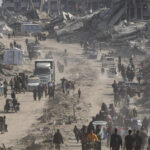South Korean law enforcement officials have requested an arrest warrant to arrest deposed President Yoon Suk Yeol as they investigate whether his brief martial law decree on Dec. 3 amounted to rebellion.
The Bureau for the Investigation of Corruption of Senior Officials, which is leading a joint investigation with police and military authorities into the takeover which lasted only a few hours, confirmed it had requested the arrest warrant on Monday. Investigators plan to question Yoon for abuse of authority and orchestrating rebellion.
Yoon dodged several requests to appear for questioning from the joint investigation team and prosecutors and also blocked searches of his offices.
It is unclear whether the court will grant the warrant or whether Yoon may be forced to appear for questioning.
Under the country’s laws, places potentially linked to military secrets cannot be seized or searched without the consent of the person responsible, and Yoon is unlikely to voluntarily leave his residence if he risks arrest.
Yoon’s presidential powers were suspended after the National Assembly voted to impeach him on Dec. 14 over his imposition of martial law that lasted only hours but triggered weeks of political unrest, halted high-level diplomacy level and shook the financial markets. Yoon’s fate now rests in the hands of the Constitutional Court. He began deliberations on whether to uphold the indictment and formally remove Yoon from office or reinstate him.
Yoon defended the martial law decree as a necessary act of governance, describing it as a warning against the liberal opposition Democratic Party, which is bogging down its agenda with its majority in parliament.
Parliament voted last week to also remove Prime Minister Han Duck-soo, who had assumed the role of acting president after Yoon’s suspension of power, due to his reluctance to fill three vacancies on the Constitutional Court before the court’s review of Yoon’s case.
The country’s new interim leader is Deputy Prime Minister Choi Sang-mok, who is also finance minister.










